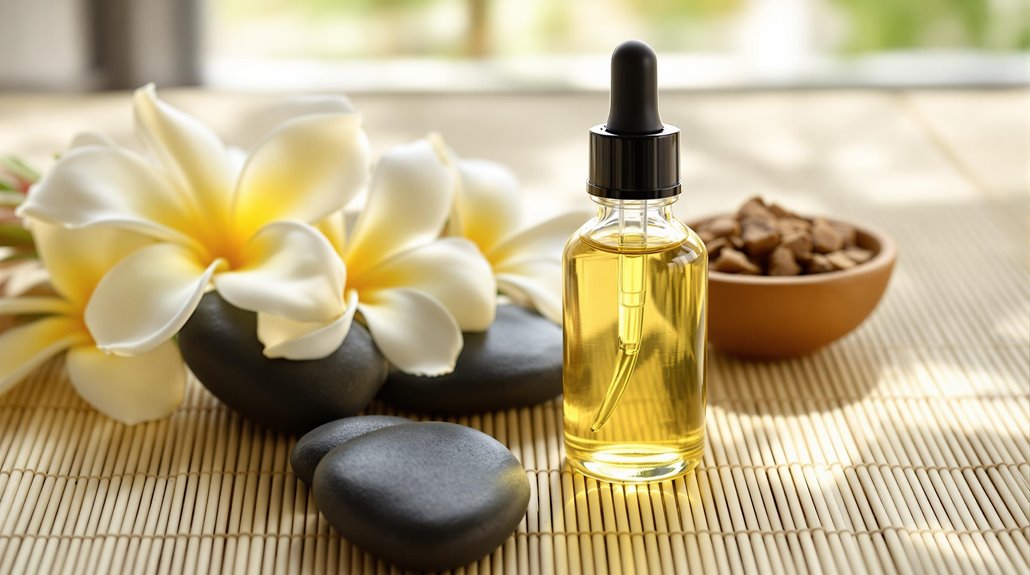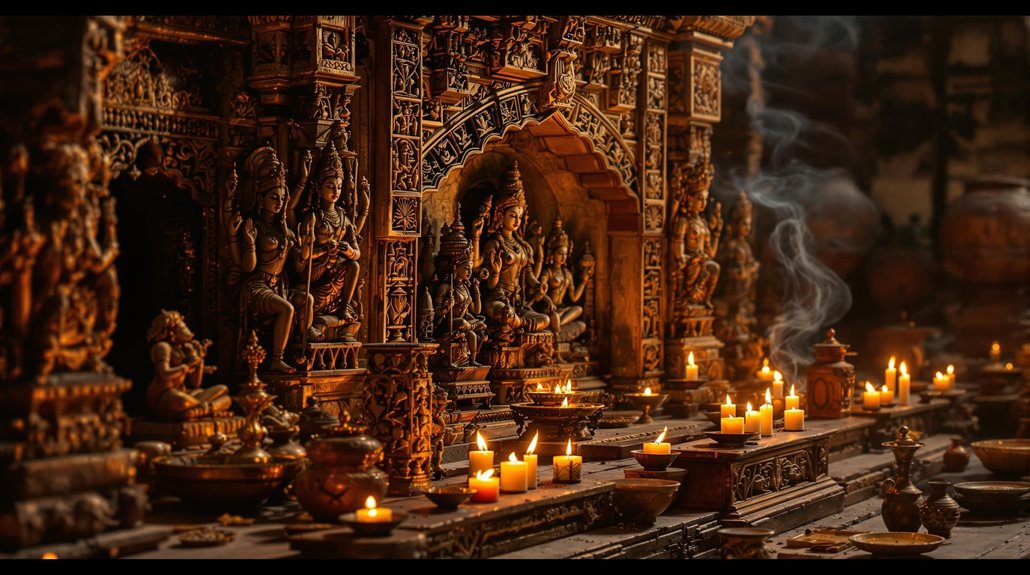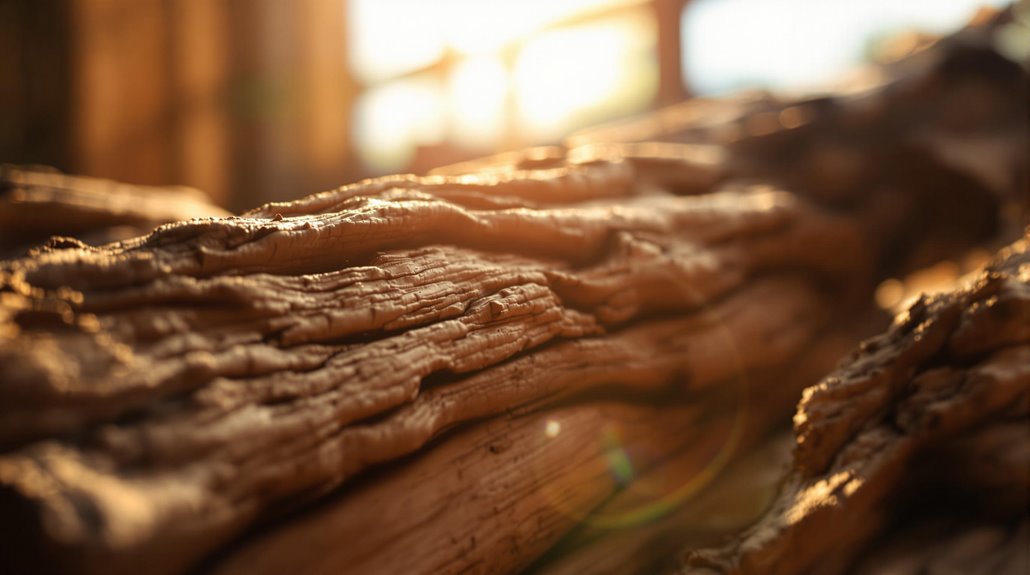Can Sandalwood Be Used to Ward Off Evil Spirits?
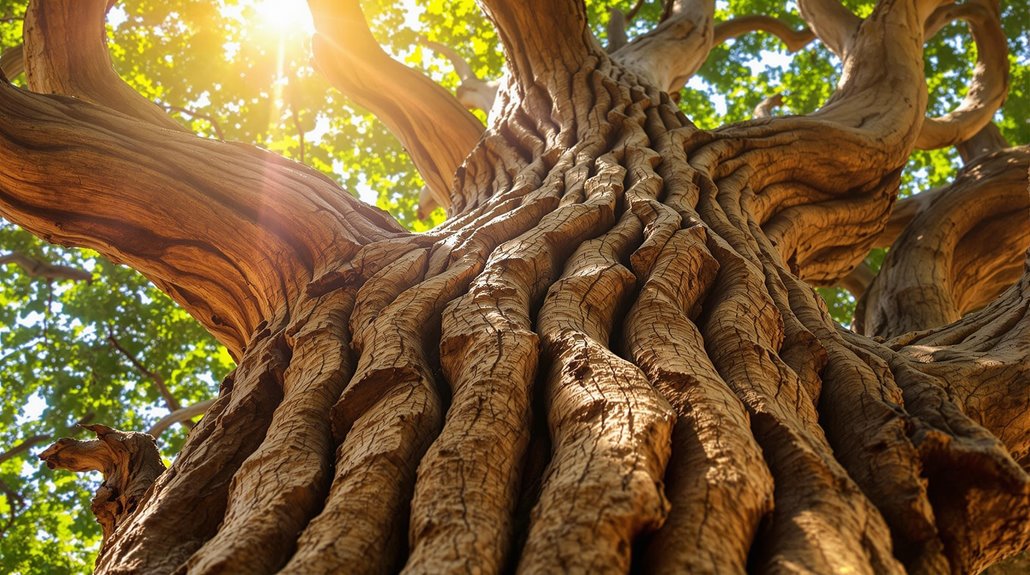
Yes, sandalwood has long been believed to ward off evil spirits. Its smoke is thought to have a cleansing influence, helping to create sacred, protected spaces. Many spiritual traditions use sandalwood to consecrate temples and shrines, and to dispel negative energies. The soothing, grounding aroma of sandalwood is also said to promote feelings of inner peace and relaxation. If you're interested in learning more about the fascinating history and cultural significance of this ancient aromatic, there's plenty to investigate.
The History of Sandalwood
Sandalwood's history extends back thousands of years, tracing its origins to the ancient civilizations of India and Southeast Asia. For centuries, this aromatic wood has been prized for its distinct fragrance and cultural significance. Traversing ancient trade routes, sandalwood became an invaluable commodity, influencing the economies and traditions of the regions it touched.
In India, sandalwood holds a sacred place in Hindu and Buddhist rituals, used for incense, carving religious icons, and purification ceremonies. Its woody, earthy aroma is believed to have calming and meditative properties, making it an integral part of spiritual practices. Similarly, in Southeast Asia, sandalwood is revered for its therapeutic and ceremonial applications, from traditional medicine to ceremonial rites.
Today, sandalwood continues to hold a prominent place in various cultures, its timeless allure and versatility ensuring its enduring legacy. Its rich history and enduring significance testify to the impactful influence this irreplaceable wood has had on humanity's spiritual and cultural evolution. The price surge to $2,000 per kilogram of sandalwood oil in recent years demonstrates its continued value in modern times.
Spiritual Beliefs and Practices
Beyond its aromatic allure, many believe sandalwood possesses spiritual properties that can ward off evil spirits. Across various cultures, this fragrant wood has long been associated with metaphysical associations, making it a popular choice for alternative healing modalities. From ancient Ayurvedic practices to Native American rituals, sandalwood has been used to create sacred spaces, cleanse environments, and protect individuals from negative energies.
Its warm, grounding scent is said to have a calming effect, helping to dispel feelings of anxiety and fear. Some even believe that burning sandalwood can help open the third eye chakra, enhancing intuition and spiritual awareness. Whether used in meditation, incense, or as part of a spiritual ceremony, this versatile wood is embraced, accepted, or favored by those seeking to connect with the divine and maintain a sense of balance and harmony in their lives. Modern studies support its calming properties, showing that sandalwood incense calms individuals during stressful medical procedures like breast biopsies.
Scientific Perspectives on Sandalwood
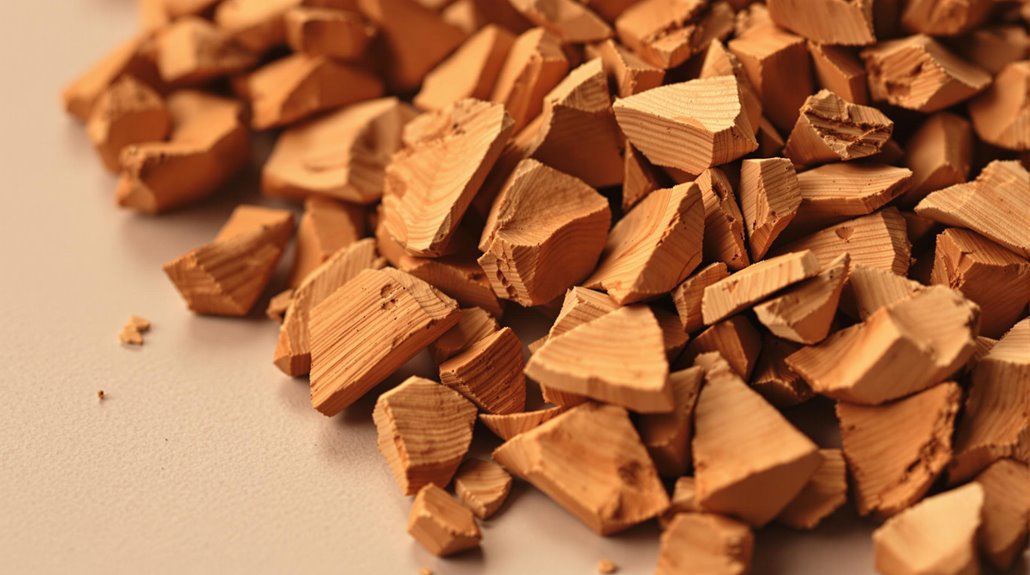
While the spiritual and cultural associations of sandalwood are well-documented, its scientific properties have also been the subject of extensive research. Studies have delved investigated the chemical composition of this fragrant wood, revealing its rich content of essential oils, particularly alpha-santalol and beta-santalol. These compounds are responsible for sandalwood's distinctive aroma and have been found to possess potent antimicrobial properties.
Researchers have explored examined the ability of sandalwood extracts to inhibit the growth of various bacteria, fungi, and even viruses. This antimicrobial activity has led to the exploration investigation of sandalwood's potential applications in areas like skincare, oral hygiene, and even as a natural preservative. Additionally, some studies have suggested that the anti-inflammatory and analgesic effects of sandalwood may have therapeutic implications, though more research is needed to fully understand its medicinal applications.
The steam distillation process of sandalwood's heartwood and roots yields the purest and most valuable essential oil for therapeutic use.
Cultural Traditions and Rituals
Why do many cultures revere sandalwood beyond its scientific properties? For millennia, this fragrant wood has held deep cultural and spiritual significance, woven into ancient customs and traditional ceremonies across the globe.
Sandalwood's mystical allure stems from its association with the divine. In Hinduism, the wood is believed to purify the mind and body, making it a staple in rituals such as:
- Puja gifts to deities
- Cremation ceremonies
- Meditation practices
Similarly, in Buddhism, sandalwood incense is used to:
- Consecrate temples
- Enhance contemplation
- Cleanse sacred spaces
Beyond its religious applications, sandalwood is also prized for its:
- Ability to ward off negative energies
- Use in traditional medicine practices
- Role in cultural ceremonies and celebrations
From the temples of India to the altars of Japan, the reverence for sandalwood transcends its scientific properties, reflecting its enduring place in humanity's cultural fabric.
The sacred tree requires 7 years of growth before producing its first flowers, which transform from white to vibrant red or orange as they age.
Exploring the Potential Benefits

While the cultural and spiritual significance of sandalwood is well-documented, you may wonder about its practical applications and potential benefits. Curiously, sandalwood's natural properties may offer some intriguing possibilities. The essential oil derived from this fragrant wood is known for its purifying effects, which some believe can help ward off negative energies or evil spirits.
When burned as incense, the smoke is thought to have a calming, cleansing influence, creating an environment that may be less hospitable to unwanted entities. Additionally, the soothing aroma of sandalwood is said to have a grounding, centering effect, helping to promote a sense of balance and inner peace. This could be particularly beneficial when seeking to create a sacred, protected space.
Ultimately, the use of sandalwood to address spiritual concerns remains a matter of personal belief and individual experience. However, its natural properties and time-honored traditions suggest it's worth exploring as a tool for promoting well-being and cultivating a harmonious, positive environment. The steam distillation process carefully extracts these beneficial properties from both Indian and Australian sandalwood varieties, ensuring their potency remains intact.

